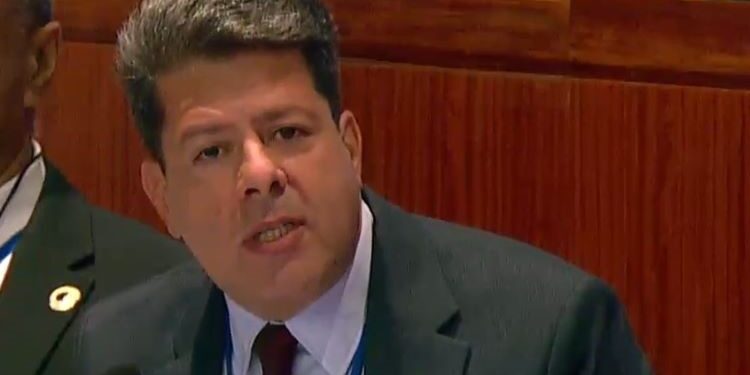Eduardo González
The Chief Minister of Gibraltar, Fabián Picardo, has assured the UN that the resolutions of the United Nations General Assembly on which Spain bases its claims of sovereignty over the Rock lack a “legal value” and were adopted “when Spain was still in dictatorship and Gibraltar was the only representative democracy on the Iberian Peninsula”.
“Every year we hear the Spanish representative tell you the same thing,” Picardo told the Special Political and Decolonization Committee (the so-called Fourth Committee) of the 79th Session of the UN General Assembly on Monday. “They talk about resolutions of the General Assembly, adopted more than half a century ago, which they say support their sovereignty claim over our homeland,” he continued.
According to Picardo, “Spain ceded sovereignty over Gibraltar, in perpetuity, in 1713” and “no resolution of the General Assembly can change that fact.” “Nor can it curtail our inalienable right of self-determination,” he added.
“In fact, there is no legal value in the General Assembly resolutions that Spain relies on, they are legally worthless” because “they are not declaratory of any principle of international law,” and “there is nothing in those resolutions that trumps the resolution that really matters,” the Chief Minister said.
“That is General Assembly Resolution 1514 (XV) which explicitly declared the existence of the right of self-determination,” he said. “This is the very right that underpins the historic agreement reached last week between the United Kingdom and Mauritius, completing Mauritius’ decolonisation. It restores its territorial integrity and allows for the return to the Chagos Archipelago of its exiled inhabitants,” he said, referring to the recent decision by the United Kingdom to cede sovereignty of the Chagos Islands to Mauritius, a territory that has no resident population because its inhabitants were evicted by the British Government in the 1960s to install a military base.
On the other hand, Picardo warned, “it is undoubtedly embarrassing for the existing, socialist, progressive Government of modern Spain to have to rely on Resolutions obtained here by what even they describe as the fascist Government of 1960s Spain¡.” “I remind the Committee that the last resolution voted on was in 1969, when Spain was still in dictatorship and Gibraltar was the only representative democracy on the Iberian Peninsula,” he said.
“Apart from having no legal value, that resolution had limited political weight, even 50 years ago – because nearly half of the United Nations’ membership at the time either voted against it, abstained, or did not vote” and, therefore, “in international law and politically, reliance on those resolutions is flawed and futile,” because “Gibraltar cannot legally be decolonised by adherence to those stale and legally worthless resolutions, let alone by integration into Spain,” warned Picardo. “In fact, such an action would not amount to decolonisation – it would result in the recolonisation of Gibraltar, but by a different colonial power,” the Chief Minister asserted.
“The ball is now in Spain’s court”
On the other hand, Picardo used his speech to urge Spain to accept “imaginative and balanced solutions” in the current negotiations on Gibraltar’s future membership in the EU after Brexit, taking into account “the best interest of all people in Gibraltar and the region” and respecting “the systems and security of the Schengen Area and the integrity of the Single Market”. “The ball is, therefore, very much now in Spain’s Court. Because any solution must also respect my people’s position on sovereignty, jurisdiction and control”, he said.
According to the Chief Minister, all parties involved in the negotiations are “working well together” in the search for “an area of shared prosperity” in Campo de Gibraltar “that delivers mutual economic benefit”. “Just last month I attended, alongside the British Foreign Secretary, the Rt Honourable David Lammy MP, the third meeting in Brussels with the Vice President of the European Commission, Maros Sefcovic, as well as a delegation from the Spanish Foreign Ministry led by Minister Albares”, he recalled. It was “socialist politicians meeting with a chance to show how we can resolve people’s problems, not exacerbate them”, he added.
.







